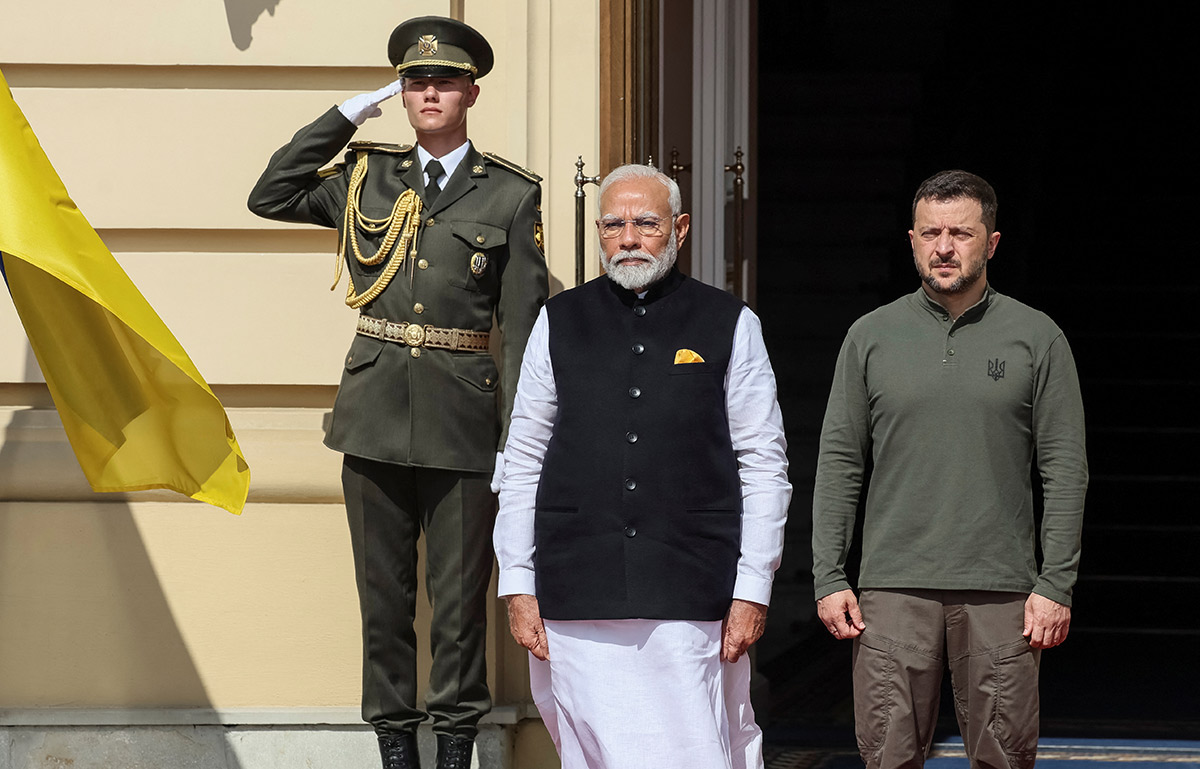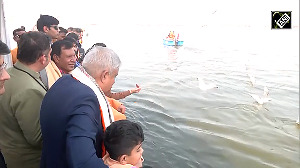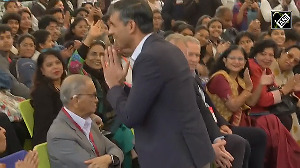In retrospect, it appeared that the bitterness of the war was still strong and the Ukrainian success in occupying Russian territory just a few days ago had added to the complexity of the situation.
The positive US response to the visit, however, remains a silver lining in the dark clouds, notes Ambassador T P Sreenivasan.

Perhaps for the first time in history, a proposed visit of the prime minister abroad became controversial even before the visit was announced.
Now that the visit has taken place, there is enough for the government and the doubting Thomases to gloat over the positions, which were taken by them.
For the prime minister, the fact that it took place without a hitch was a success in itself.
The key point he made that India was not neutral in the conflict, but on the side of peace was a point worth making from the soil of Ukraine, though it did not give Zelenskyy any cause for comfort.
He promptly pointed out that he would like to have India on its side and not just on the side of peace.
In a way, the visit to Ukraine was for India a return to the Nehruvian era, when India looked at conflicts dispassionately and took positions, even if they appeared incongruent to the principles of nonalignment we championed.
India was welcome to participate in international efforts for peace as we did not seem to have an axe to grind.
Till 1962, India could afford to be a benign presence in conflict situations.
But when we began to look at the world as a victim of aggression, we began seeking justice, together with peace.
Our Tashkent experience prompted us to be wary of any kind of mediation in the case of Pakistan and China.
Today, India is not seen as a peacemaker, but as a nation which is seeking its place in the world, fighting every inch of the way.
We express our views in our enlightened self-interest and even remain alone, if necessary, regardless of the consequences.
We have realised that any mediator will want to extract concessions from both parties to reach an agreement as it happened in Tashkent and bilateral negotiations based on fundamental positions were found to be more advantageous, even if the problems remained unresolved.
The respect for the UN Charter and commitment to treaties made our arguments credible.

Prime Minister Modi had his own reasons to turn to peacemaking at this time in world history.
The total irrelevance of the United Nations Security Council in tackling the crises of the 21st century is an important factor.
9/11 was a major turning point on the issue of terrorism and it appeared that the UN would take united action urgently against terrorism.
But soon the issue of definition of terrorism surfaced and a comprehensive convention on terrorism could not be adopted.
The stories of the economic meltdown, COVID-19, the Russia-Ukraine war and the war in Gaza are no different.
The scheme in the UN Charter for preventive diplomacy, ceasefire, peacekeeping and peace building totally failed in all these cases.
A veto wielding permanent member waging a war against another member State of the UN and another permanent member shielding atrocities committed by a country in the name of its security for itself are unprecedented.
A permanent member blocking action for international cooperation in fighting a pandemic was the unkindest cut of all.
The members of the UN have the responsibility to create a new mechanism to deal with the matters of international peace and security.
The meetings of the G20 discussed these issues and even produced a consensus on the Russia-Ukraine war at the G20 summit in New Delhi.
Moreover, India's position on the war, which did not condemn Russia and retained communication with Ukraine were seen as positive for peacemaking.
In the face of a total impasse in negotiations, suggestions were made by several countries that India's unique position should be put to use.
Prime Minister Modi's visit to Moscow last month was particularly significant in this regard and it was after weighing all these factors that he announced his visit to Poland and Ukraine.

No summit fails, particularly when the expectations are low.
The optics were right because the two leaders ensured that the undercurrents of tension and anxiety were not allowed to surface and both leaders managed to maintain friendliness and cordiality.
Things went beyond hugs and PM Modi showed his sympathy by keeping his arm on Zelenskyy's shoulder and all the words heard on television were soothing and reassuring.
But former foreign secretary Kanwal Sibal listed several 'most improper' comments by Zelenskyy at his press meet.
Zelenskyy chided India for buying Russian oil and fueling Russia's coffers and gaining benefits in the bargain.
He also said that Putin had showed disrespect to Modi by bombing a children's hospital in Kiev.
He also said that India could be part of his peace plan, but Ukraine would not make compromises on principles or values.
He said the next peace summit could be held in India, but he told the PM that that it could not be held in a country that had not signed the communique of the first summit.
He virtually rejected any mediation by saying that he wanted India on his side and not 'balancing between us and Russia.'
In a sense, he wiped out the value of dialogue and India remaining on the side of peace.

No one had expected that PM Modi's visit would result in a resolution of the conflict.
It was a goodwill visit to demonstrate India's good intentions and to demonstrate our strategic autonomy.
It was also an answer to the US position that strategic autonomy would not apply in the event of war.
PM Modi expected that his visit would create an atmosphere of dialogue and peace.
But in retrospect, it appeared that the bitterness of the war was still strong and the Ukrainian success in occupying Russian territory just a few days ago had added to the complexity of the situation.
The positive US response to the visit, however, remains a silver lining in the dark clouds.
The geopolitical situation of the early years of the 21st century is not an era of peace as we see nations, big and small, are seeking a comfortable space in the evolving world order.
The failure of the UN has left a gaping hole in the international system and the best we can hope for is to develop an alternative.
India's championing of peace and developing a voice for the Global South should be seen as building blocks in that effort.
Ambassador T P Sreenivasan is a long-time contributor to Rediff.com.
You can read his earlier columns here.
Feature Presentation: Aslam Hunani/Rediff.com






 © 2025
© 2025